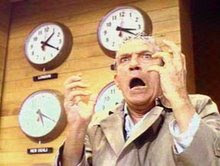Sidenote: I haven't written here in nearly two months. It's not that I have had nothing to say, it's just that I have been venting verbally. By the time I sit down, the urge to vent has passed. However, I thought I better put something down. So here it is.
It has been said that there are no original ideas. Even when you have a thought you think is original, you pick up a book or read an article written years ago that contains your idea.
A
couple of rants ago I expressed the opinion along the lines that most people are stupid and that the more advanced a society becomes the less knowledgible the average population is. Well, this opinion was expressed by Mencken about 75 years ago.
I am reading "H.L. Mencken on religion, edited by S. T. Joshi". Mencken was a newspaper man, essayist and political commentator in the early to mid 20th century.
His philosophy and beliefs are:
I believe that religion, generally speaking, has been a curse to mankind - that its modest and greatly overestimated services on the ethical side have been more than overcome by the damage it has done to clear and honest thinking. I believe that no discovery of fact, however trivial, can be wholly useless to the race, and that no trumpeting of falsehood, however virtuous in intent, can be anything but vicious. I believe that all government is evil, in that all government must necessarily make war upon liberty... I believe that the evidence for immortality is no better than the evidence of witches, and deserves no more respect. I believe in the complete freedom of thought and speech... I believe in the capacity of man to conquer his world, and to find out what it is made of, and how it is run. I believe in the reality of progress.But the whole thing, after all, may be put very simply. I believe that it is better to tell the truth than to lie. I believe that it is better to be free than to be a slave. And I believe that it is better to know than be ignorant.An interesting set of beliefs that have a lot of merit. I like the one about "no discovery of fact can be wholly useless". That one goes out to those who keep asking what practical use could there be for my research.
Anyway, he formulated my ideas years ago and wrote about them in a far better way. In fact, as I am reading this book, it is quite scary to find how close I am to his way of thinking. But it's early days and I'm not even through the first chapter. I may have to read other works by him.
I'll leave you with a few quotes from him:
For every complex problem there is an answer that is clear, simple, and wrong.
Nobody ever went broke underestimating the intelligence of the American people.
Democracy is the theory that the common people know what they want and deserve to get it good and hard.
Giving every man a vote has no more made men wise and free than Christianity has made them good.
Every decent man is ashamed of the government he lives under.
